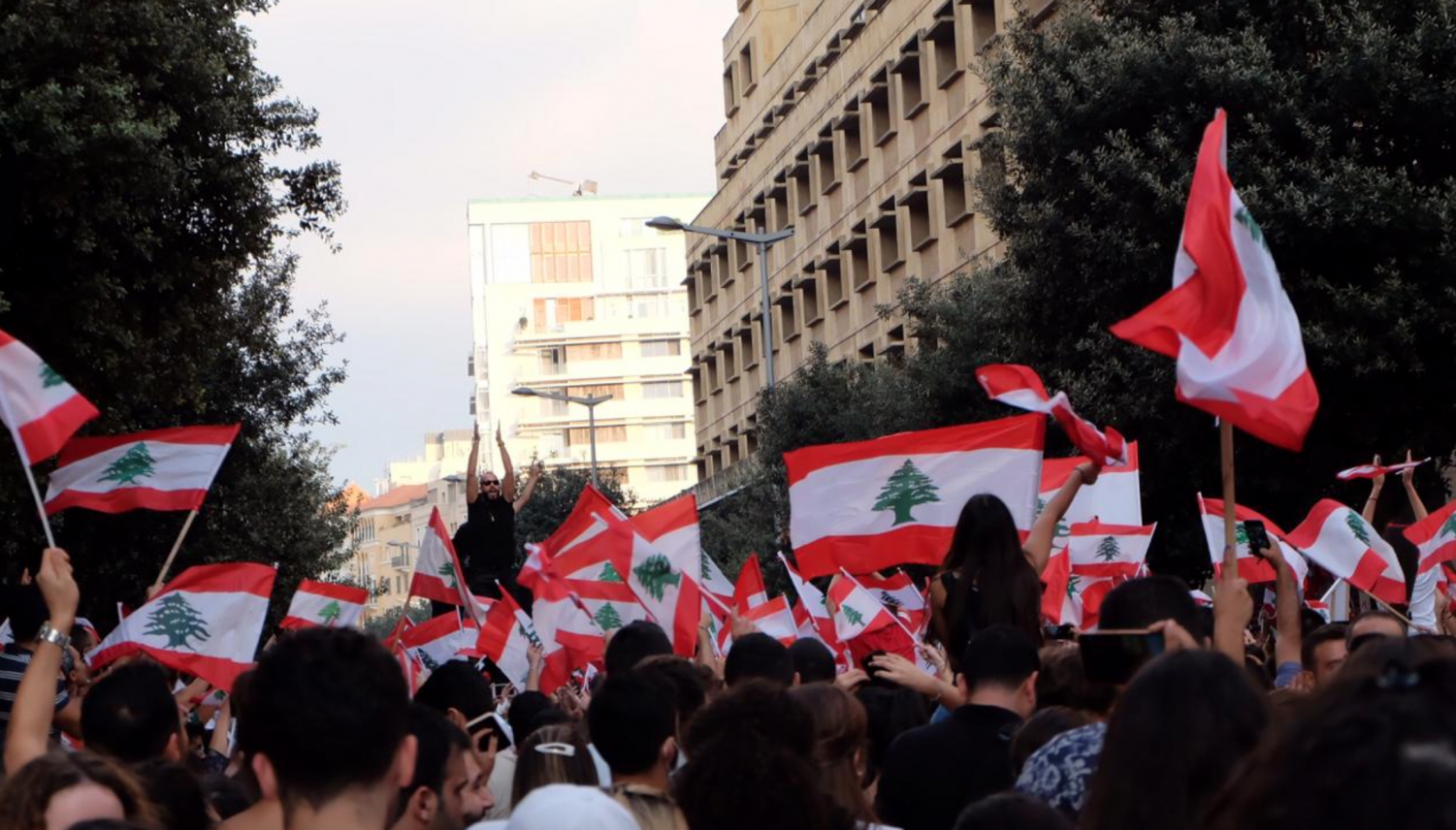
Twitter: @miraabhatt


March 30, 2020
Fourteen-year-old Yara Moawad wakes up early on a Monday morning. She brushes her teeth and gets ready for school, only to find out that it had been canceled again — for the fourth week in a row.
She tries to text her friends, but the connection is too weak.
She wants to go out, but she can’t. All of the roads are closed.
The streets of Beirut, Lebanon, have been jammed with protesters since Oct. 17, 2019. The protests initially began with a small number of people. However, the movement has dramatically grown to become the biggest anti-government protest in Lebanon since the civil war ended in 1990, according to website Foreign Policy.
“The Revolution ignited sister protests in over 50 cities around the world such as Los Angeles, Dublin, Sydney, Stockholm, Vancouver, Michigan, Paris, Geneva, London, and many more,” said Cristina Saddi, a 14-year-old girl who lives in Beirut.
Beirut protests 2019 / Shahen Araboghlian / Wikimedia Commons / CC-BY-SA 4.0
Lebanese citizens fill the streets and wave the Lebanese flag in protest of taxes on internet-based calls.
The Lebanese government’s decision to tax internet-based WhatsApp calls was the tipping point for many Lebanese citizens, who have faced poor economic conditions for decades.
According to the Lebanese newspaper Annahar, Lebanon has nationwide unemployment and poverty, with youth unemployment at 37% and general unemployment at 25%, as of August 2019. Likewise, over the last several decades, it’s become common for citizens to be rationed to eight hours of power per day.
“The electricity is bad, and we have poor connection; we just want all of this to stop,” Moawad said.
According to the International Institute for Environment and Development, many people don’t have access to drinking water and must buy bottled water instead. The country also suffers from poor sanitation and sewage infrastructure. Four years ago, the streets of Beirut were lined with mountains of trash caused by poor waste management.
On top of that, Lebanon has one of the highest levels of income inequality in the world.
According to the Carnegie Middle East Center, the wealthiest 0.1% of the population earns the same as the bottom 50%. The country has one of the highest amounts of public debt in the world and is in a deep recession. Tensions have been rising as people believe Lebanon’s government policies are leading to an unfair distribution of wealth.
“This revolution is about the government’s rampant and uncontested corruption, which has been going on for decades. By people protesting, the government knows that they messed up the country,” Saddi said.
Moawad and Saddi feel that their experiences have been positive and peaceful, but the media has chosen a negative portrayal.
“[The media] is showing the world such a bad image of the protests. They’re saying that there’s violence and that the protests are only because of the taxes, but it’s more than that,” Moawad said.
Moawad and Saddi, along with many other Lebanese citizens, are not only fighting against tax increases but also to improve their basic standard of living, including functioning electricity and better waste management.
They are pushing for reforms such as investment in schools, an increase in wages, and access to better healthcare.
The teens in Lebanon are living through a historic turning point.
“For the first time, Lebanese citizens are putting their religious and political beliefs aside, joining forces as one, and taking to the streets to peacefully demand the government’s resignation,” Saddi said.
Moawad attends protests when she can, but many times the roads are closed. She and her peers participate to express their discontent with the government and their desire for profound change in the country.
“At the protests, we sing songs that we created, we scream, we shout, we wave the Lebanese flag, and one day, we made a human chain from north to south,” Moawad said.
Saddi has participated in eight protests; her first one was the most memorable.
“It was the third day of the revolution, and I didn’t know what to expect; I wasn’t used to this,” Saddi said. “I was with my friends, so we had a great time together, and the protesting experience was amazing.”
Saddi enjoys the protests and feels as if they give her a chance to express herself.
“It might seem weird, but they play Lebanese music, and we all sing and dance to it. In some cities, couples got married, and people celebrated Halloween during protests,” she said.
Historically, protests often tend to be violent with minimal participation from families and children, yet Moawad feels that these protests are relatively peaceful.
“I feel very safe at the protests; it’s amazing,” Moawad said.
If violence erupts at the demonstrations, members of the Lebanese community are prepared to help. According to Saddi, food, transportation, medication, and legal consultations are all given to protesters, free of charge.
So far, the demonstrations have brought hundreds of thousands of Lebanese people to the streets, paralyzing the country’s transportation and banking system. According to a Lebanese newspaper, The Daily Star, the protests drove the resignation of Prime Minister Saad Hariri on Oct. 29, 2019. Despite this success, teens still feel as though their voices are not as heard as they could be.
“I love my country, but our generation is not given enough opportunity. We’re protesting against the government, and we believe that this is where it ends,” Moawad said.
Nonetheless, both teenagers are optimistic about the future and believe that the protests will make a difference.
“This feels like a life-changing movement for Lebanon because we won’t stop until we get what we want; the protests are our only hope,” Moawad said.
Lebanon is not the only country in the midst of a revolution. Citizens in other countries such as Ecuador, Chile, and China are also protesting against their governments.
Protests in Hong Kong began March 21, 2019, and have not stopped since. These protests were instigated after the Hong Kong government proposed a law that would extradite criminal suspects in Hong Kong to mainland China.
According to CBS News, citizens of Hong Kong are worried that they could be unfairly arrested under the laws of mainland China and could face unfair trials and violent treatment. Meanwhile, the protests have escalated and grown increasingly more violent.
“We’ve had several times when we have to either send people home early from work or tell them to work from home because there have been severe protests,” said Neil Vesta*, who has lived in Hong Kong for over 20 years.
The protests do not directly impact his family because they live outside of Hong Kong, but getting into the city can be hard.
“On days there are protests, the school bus is canceled going into the city. Then you have to get your own ride home or leave early,” said Maia Vesta*, Neil’s 14-year-old daughter.
While protesters are fighting for what they believe is right, the protests have also had some negative consequences.
“It’s affecting the economic situation of the city. There are a lot of businesses that are now closing because they’re not getting as much business as they used to. Not many people are visiting Hong Kong, and all these restaurants in the city are getting half the traffic that they used to before. They’re not making money and [are] therefore shutting down, putting more people out of business,” Neil Vesta said.
Hong Kong is facing the repercussions of protests and Lebanese students are now making up the school they missed on Saturdays; but they are willing to make these short term sacrifices in hopes of improving their countries in the long run.
*Due to the sensitive nature of the content, these names have been changed to protect the anonymity of the sources.

Abby Thompson • Apr 26, 2020 at 5:30 pm
Hello Mira,
Thank you for this great and informative article. Your writing is amazing and if not for your short bio at the end, I would have assumed you were a professional journalist. I appreciate your use of interviews with the two youths in Lebanon. I will be using your well written article for a paper about the youth in Lebanon for my Modern Middle East History class. Don’t stop writing!